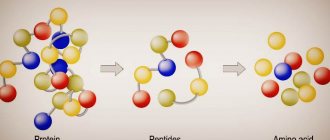What is protein
From a biochemical point of view, protein is a biologically active substance consisting of structural building units - amino acids.
Protein is a macronutrient and must be ingested daily in relatively large quantities, along with food.
Protein is the main building material for muscles. Its lack in the diet leads to a slowdown in muscle growth or its complete stop.
With a critical lack of protein, the human body begins to “eat” itself. The processes of catabolism develop - the breakdown of tissues, including muscle.
With regular strength training, intake rate doubles and is 2 grams per 1 kg of body weight per day.
There are proteins of animal and plant origin, which can be supplemented by taking a food supplement obtained artificially from the same products - protein.
Protein as sports nutrition comes in the following types:
- Whey “fast”
- Casein “slow”
- Egg
- Beef
- Vegetable
- Combined (4-6 types listed above)
What is BCAA
Among the variety of amino acids, BCAAs are definitely in first place in terms of importance for muscle growth.
They contain three amino acids - valine, leucine and isoleucine.
They are classified as essential, that is, those that are not synthesized in the body independently. About 30% of muscle tissue consists of them.
The term comes from the English Branched Chain Amino Acids - amino acids with branched side chains.
With their help, various biochemical reactions occur in the muscle cell:
- Restoring muscle microdamage after strength training
- Increased physical performance during the lesson
- Act as an alternative source of energy in the muscle cell
- Protect muscles from breakdown
- Participate in the synthesis of other amino acids (glutamine, alanine)
The largest amount of BCAAs is found in natural protein products of animal origin. Vegetable protein is inferior in this indicator.
With intense power loads, the body's need for BCAAs increases. To ensure their supply in the required quantity, bodybuilding has adopted additional intake of this substance in the form of a dietary supplement.
According to the release form, there are powder, tablets, capsules and liquid forms. With their advantages and disadvantages, they all provide approximately the same effect.
What is whey protein
When milk sours, two products remain. Cottage cheese, which is the solid residue, and whey, the liquid component. Whey can be turned from liquid to powder by removing all the water. There are many types of protein powder, but when people talk about protein, they usually mean whey. Whey protein is an easily absorbed form of protein. This is why it is best suited after a workout. Some benefits of taking whey:
- Helps build muscle;
- Reduces recovery time;
- Quickly absorbed by the body;
- Reduces muscle fatigue;
- Protects muscles;
- Reduces appetite;
- Relatively inexpensive.
Whey has been shown to have the greatest positive effect on muscle protein synthesis, especially during strength training, in various studies. Also speeds up recovery. Whey gives you a feeling of fullness and prevents excessive overeating after exercise. Research also shows that whey protein speeds up metabolism and thus helps burn fat without damaging muscle tissue.
What are the benefits of whey protein?
This may seem like unobtrusive advertising, but it's true - you'll get much more value from it. Here's what can be said in favor of this supplement:
- Compared to meat, it is cheap;
- Rapidly absorbed;
- Contains all necessary amino acids in large quantities;
- Contains the same BCAAs;
- Much easier to consume than other protein sources.
And finally, the most important thesis of this article!
We realized that about five grams of BCAA per day is enough to develop muscle mass. Fatigue and pain are also reduced.
We also noticed that overconsumption of one amino acid can cause an imbalance due to competition between amino acids.
Most protein powder supplements contain 5 grams of BCAA per serving.
And if you already drink a protein shake, then you shouldn't waste money on BCAA.
The only example of a situation where you would need BCAA is in a bodybuilding competition. In this case, you will have to remove protein from your diet. But this is a rather rare situation, and therefore irrelevant.
What is the best thing to take after a workout?
Essentially, BCAA is the same protein found in any protein shake.
But after strength training, it is very important to ensure the rapid flow of plastic material into the muscle cell. And here amino acids in the form of a separate supplement are in the lead.
Taking BCAAs is recommended 10-15 minutes before the end of your workout. This is exactly how long it takes to absorb it if the stomach is empty.
As for the BCAAs contained in whey protein, their absorption rate is slightly slower. There they are mixed with other types of amino acids, as well as carbohydrates and fats, which slow down this process.
Consumption of supplements together
The answer to the question whether it is possible to mix protein and BCAAs lies on the surface.
BCAAs are responsible for ultra-urgent (instant) muscle recovery. Therefore, it is important that amino acids are absorbed quickly and completely. To do this, it is advisable not to mix them with protein.
This rule applies primarily to post-workout use.
On rest days, BCAAs and protein can be taken together. Although here the practice of separating them by time is common.
The logic here is simple - the more often you take these supplements during the day (natural food also counts), the higher the likelihood of consistently high levels of amino acids in the blood. And this guarantees muscle growth.
What is better to choose - BCAA or protein, and for what purposes?
We’ve sorted out the difference, now let’s find out the benefits of individual supplements in relation to the athlete’s goals.
If the goal of training is to gain muscle mass, you should pay attention to protein, and several types - fast and slow. In this case, protein acts as a food replacement for the athlete after training and during the day. Fast proteins - quickly restore, saturate with material for muscle growth, both proteins and carbohydrates, and slow proteins - take a long time to digest for constant saturation with protein, even during a night's sleep.
This means that for those who are gaining weight, it is better to take protein, and choose its components and dosages depending on the constitution, indications, form of the protein and price.
As for amino acids, they are able to quickly restore the body, ensuring the synthesis of new cells, and also quickly prevent catabolism, but BCAA are not able to saturate with protein for a long time. Yes, and you need to eat more food with them, since they do not cancel or supplement the daily need for dietary supplements, unlike protein.
But BCAA are best suited for those who are cutting, dieting, or simply want to quickly restore muscles after hard training, and not only strength training, but also aerobic training.
There is nothing unnecessary in BCAA, no ingredients in the form of sugar, which complicates the weight loss process, especially important for diabetes and those people who limit sugar in their diet.
When is the best time to take essential amino acids and protein?
It is better to take protein 2 times a day:
- immediately after training;
- and during the day (morning, afternoon, evening) depending on its type according to the manufacturer’s recommendations.
You can also take protein an hour before training, if it is not possible to eat on time, but not earlier.
Amino acids are also taken in 2 servings (depending on the brand) of powder or tablet form per day:
- It is better to take the first one immediately after sleep, and after half an hour have breakfast;
- and the second - before training 30 minutes.
Also, on a rest day , BCAA can be taken at any time if there is a large gap between meals to prevent catabolism.
Is it possible to take BCAA and protein together and how to do it correctly
BCAA and protein can be taken together, but not at one time, but evenly dividing the portions of the supplements throughout the day.
Can be consumed on training days according to the following scheme:
- In the morning after sleep: one serving of BCAA or whey protein of your choice.
- Pre-workout: one serving of BCAA.
- Post-workout: Whey protein.
- In the evening or at night, you can take complex protein or casein (if available).
Admission rules
Summarizing all that has been said, we highlight the regimen for taking protein and BCAAs:
- On training days
10-15 minutes before the start of your workout, take one serving of BCAA - 5 grams. For advanced athletes with large muscle mass – 10 grams.
This is followed by another portion 10-15 minutes before the end of the workout.
Another option for use on a training day is when the entire daily requirement (for amateurs 5-10 g, for athletes 10-20 g) is evenly distributed throughout the entire workout.
15-30 minutes after exercise, a portion of whey protein in water is recommended. This way it will be absorbed faster than with milk or juice.
You can take another serving of protein at night. Ideally, slow casein or complex.
Here it is better to dilute the concentrate with milk to increase the period of protein absorption even further. This technique helps to minimize nighttime breakdown of muscle tissue.
- On days off from strength training
It is better to start the morning with a portion of BCAAs, taking amino acids immediately after waking up, on an empty stomach. After 10-15 minutes, you can drink a portion of whey protein in water, and after 30-40 minutes, have breakfast with natural food. This way you will quickly stop night catabolism.
Take another serving of BCAAs throughout the day. As a rule, 10-15 minutes before meals. It is also recommended to take a serving before bed.
You can take any type of protein during the day. Whey or complex - it doesn’t matter, the main thing is that the intake of protein from natural products and sports nutrition occurs regularly and at short intervals.
The ideal frequency of meals is every 2-3 hours. At night you can take “slow” protein.
How much to take BCAA
The optimal single dose of BCAA is 4-8 grams, both when losing weight and when gaining muscle mass. The frequency of administration is 1-3 times a day. Smaller doses of BCAA are also effective, but they will no longer fully cover the body's needs. Many manufacturers cheat and produce BCAA in small doses, although the price remains high, so always look on the back of the package for the number of servings and the size of one dose of BCAA. The duration of taking BCAA is not limited, breaks and cycling are not required. The dosage of BCAAs is indicated without taking into account their content in protein supplements and products (any protein contains these amino acids, but the aspect of additional intake is discussed, provided that a sufficient amount of protein is received per day).
How to use
Returning to the question of whether it is possible to mix protein and BCAA, it is worth making a reservation that you should not mix them specifically. Take together - yes, but not at the same time. This is not harmful, not dangerous, but irrational. Protein is absorbed more slowly than BCAA, and if you mix both products together, you get something in between. If you are already taking protein or amino acids separately, you may not need to disrupt your existing regimen.
The main thing is not to take BCAA and protein together, that is, do not mix them. Otherwise, the advantages of BCAA in the form of a high rate of absorption will come to naught, since by combining with slower chains in the protein they will take on their properties.
Protein intake is usually carried out 30-40 minutes before the start of training, but BCAs should be taken just before the start of classes, or after the start, during a break. In addition to the option of taking protein and BCAA together, many are looking at proteins with BCAA already included in their composition. Such a cocktail has its place, but if you need quick, high-quality results, then it is better to consume pure protein and BCAA complex separately. You can take protein in the morning, 30 minutes before or 30 minutes after training. This supplement needs time to break down, because even fast whey protein is absorbed more slowly than BCAA. Amino acids should be taken immediately before training, or even during it.
When to take protein and BCAA
- In the morning, one serving of protein to replenish the reserves lost during the night.
- One serving 30-40 minutes before training will give the body the strength to perform the exercises.
- Before starting exercise or even during a break, take BCAA.
- Another portion of protein can be taken 30-40 minutes after training to gradually replenish the amino acid balance.
When talking about how to take protein and BCAA, we are talking about whey and complex protein. Casein is taken differently, as its absorption rate is even lower, and it should be taken before bed or if you plan to have a long period of time between meals. When gaining muscle mass
The best times to take BCAA's are before, during and immediately after exercise.
It is best to prepare an energy drink by dissolving a portion of amino acids and a few tablespoons of sugar in water. This will ensure a constant flow of fluid, carbohydrates and amino acids into the blood throughout the entire workout.
As mentioned above, the body needs BCAA only during and after training, this is when BCAA are most effective, so they need to be taken before and immediately after training, as well as during it if it is a soluble form. You can also take a portion of amino acids immediately after sleep to suppress morning catabolism. Studies have shown that BCAAs are effective even when mixed with a protein shake.
When losing weight
BCAA should be taken in the same way as described above: before training and immediately after training, soluble forms - during training. In addition, when losing weight, you can take BCAA in between meals in order to suppress catabolism, appetite and preserve muscles, but it is more profitable to use protein for these purposes.
When losing weight, BCAAs are best taken during training to restore muscles, and between meals to suppress appetite.










